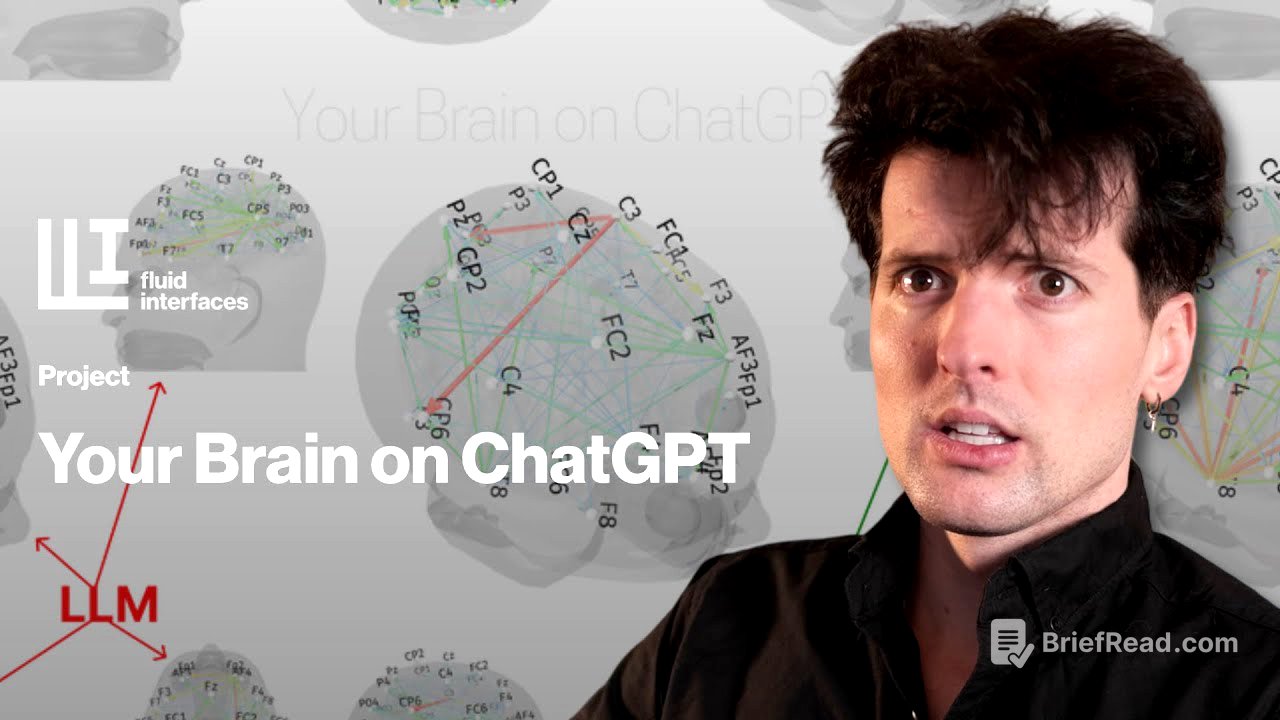TLDR;
This video discusses a recent MIT study exploring the cognitive impact of using Large Language Models (LLMs) like ChatGPT on learning, specifically in the context of essay writing. The study suggests that relying heavily on AI tools may lead to decreased neural connectivity, reduced ownership of the written content, and difficulty in recalling information. The video emphasizes the importance of interpreting the study's findings within its specific educational context and cautions against generalizing the results to all AI usage scenarios. It also highlights the study's limitations and the need for further research to understand the longitudinal impacts of AI on cognitive skills.
- The study indicates that using LLMs may reduce cognitive engagement and neural connectivity compared to using search engines or relying solely on one's own knowledge.
- Participants who heavily used LLMs showed lower ownership of their essays and struggled to recall the content they had written.
- The video argues that the study's findings are context-dependent and should not be interpreted as a blanket statement about the negative impact of all AI tools on intelligence.
Intro [0:00]
The video starts by addressing the question of how AI impacts our brains, specifically whether it helps or hurts cognitive functions. A recent study suggests that using AI may lead to a decline in cognitive abilities. The video aims to examine the significance of these findings and explore ways to prevent cognitive decline while using AI tools.
Work OS Sponsor [0:52]
The video includes a sponsorship message from Work OS, a platform designed to help developers integrate enterprise-ready features into their applications. Work OS simplifies the process of setting up features like SAML and SSO, making it easier for companies to work with enterprise clients. The platform offers a free tier for the first million users.
MIT Study Summary [2:37]
The video presents the official summary of an MIT study that investigates the cognitive cost of using LLMs in the educational context of writing an essay. The study assigned participants to three groups: an LLM group, a search engine group, and a brain-only group. The study used EEG to record brain activity and NLP analysis to assess cognitive engagement and load. The results indicated that brain connectivity scaled down with the amount of external support, with the LLM group showing the weakest overall coupling. Participants in the LLM group also demonstrated lower ownership of their essays and struggled to recall the content they had written.
Study Analysis and Personal Bias [6:43]
The video addresses potential biases in interpreting the study's results, particularly concerning the use of AI in coding. The speaker acknowledges that their extensive experience in coding before using AI may influence their perception of AI's impact on cognitive load. The speaker expresses concern that new programmers who start with AI assistance may not develop the same neural pathways as those who learned to code without it. However, the speaker also notes that AI tools like code review can improve efficiency and allow developers to focus on higher-level tasks.
Study Details and Limitations [11:09]
The video discusses the limitations of the MIT study, including the limited number of participants, the specific geographical area, and the use of only one LLM model (ChatGPT). The study also focused on essay writing in an educational setting, which may not be generalizable to other tasks. The researchers emphasize the need for future work to include more diverse participants, different LLM models, and other modalities beyond text.
Paper Analysis [14:52]
The video analyzes the study's paper, noting that participants in the LLM group were restricted to using OpenAI's GPT-4 as their sole resource of information. The essay prompts were opinion-based, which may have influenced the usefulness of search engines. The video suggests that a more controlled experiment, such as a fake history course, could yield different results. The video also points out that the LLM group's ownership of the essays increased over time as they became more familiar with using the AI tool.
Study Results and Reporting Concerns [20:31]
The video expresses concern about the bombastic way the study is being shared, particularly regarding the reported reduction in brain connectivity. The video highlights that teachers could sense something was wrong with the essays written by LLM users, describing them as soulless and lacking personal insights. The video concludes by stating that the study is valuable but its findings should not be blown out of proportion. The video aims to present the reality of the study and encourages viewers to share their thoughts on the matter.




![Learn Python - Full Fundamental Course for Beginners | Python Tutorial for Beginners [2019]](https://wm-img.halpindev.com/p-briefread_c-10_b-10/urlb/aHR0cDovL2ltZy55b3V0dWJlLmNvbS92aS92X1M2NGtsZHJ5Yy9ocWRlZmF1bHQuanBn.jpg)




